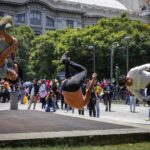New Zealand Election Day: A Unique Approach to Democracy
A Reflection on New Zealand’s Election Laws
New Zealanders are set to head to the polls on Saturday for the final day of voting in their nation’s 54th general election. However, what sets this election apart from others around the world is the implementation of some unique election laws that restrict campaigning and media coverage on election day. These laws aim to create a more reflective and contemplative atmosphere for voters, but they also raise questions about the nature of democracy and the role of media in shaping public opinion.
A Ban on Campaigning and Media Coverage
At midnight ahead of each election, political campaigning must come to a halt, and the news media is prohibited from publishing new political stories. Additionally, political party signs that line busy traffic intersections must be taken down. These restrictions are in place to prevent any attempts to influence or persuade voters on election day. It is a criminal offense in New Zealand to engage in activities that could be seen as encouraging or stirring up voters’ emotions on election day.
The origins of these laws can be traced back to 19th-century England, from which New Zealand derived its parliamentary model. The aim is to create a space where voters can quietly and privately consider their choices, without being influenced by last-minute campaigning or media coverage.
The Philosophy of Quiet Deliberation
According to Prof Andrew Geddis, an expert in electoral law from the University of Otago, these laws send a clear message to voters: they must consult their conscience in private and vote in a manner similar to making a prayer to God. This approach prioritizes individual reflection and decision-making, rather than relying on external influences or the momentum of a political campaign.
This philosophy of quiet deliberation is a stark contrast to the lively and colorful experience of voting in neighboring Australia. Australians are greeted by political party volunteers handing out flyers, and many polling stations offer a “democracy sausage” barbecue. These stark differences highlight the unique character of New Zealand’s electoral process.
Challenges and Controversies
While New Zealand’s election laws have a long-standing tradition, they are not without their challenges and controversies. Some argue that these laws are outdated and do not align with the realities of modern voting. Richard Shaw, a political professor at Massey University, describes many of the rules as “historic legacy” that may not suit the current voting landscape.
Another major challenge is the media blackout on election day. Unlike in the United States, where election day coverage is fast-paced and heavily reported, New Zealanders remain in the dark about the results until the media blackout lifts at 7pm. This lack of real-time information can be frustrating for voters who are eager to know the outcome of the election.
Furthermore, there have been concerns about the enforcement of these laws. While there have been no fines handed out for breaking the rules, the Electoral Commission scolded several foreign politicians during the last election in 2020 for showing support on social media for a New Zealand party or candidate. This raises questions about the practicality and effectiveness of these restrictions in the age of social media and global connectivity.
An Evaluation and Advice
Balancing Tradition and Modernity
New Zealand’s unique approach to election day reflects a delicate balancing act between tradition and modernity. While the laws may have historical significance and promote a contemplative voting process, it is essential to re-examine these rules in the context of the present day. The rise of social media and the ease of global communication necessitate a re-evaluation of the restrictions on campaigning and media coverage.
There is a need to find a middle ground that preserves the integrity of the voting process while allowing for the free flow of information and public discourse. This could involve revisiting the scope of the media blackout or exploring alternative ways to engage voters without compromising the spirit of reflection and independence.
Embracing Public Debate and Engagement
As New Zealanders continue to exercise their democratic right, it is crucial to encourage public debate and engagement throughout the election process. While the day of reflection is valuable, it should not overshadow the need for robust political discussion and the active participation of citizens in shaping their nation’s future.
To achieve this, political parties, civil society organizations, and media outlets should focus on promoting informed and substantive discussions, both in the lead-up to the election and afterward. This can be done by organizing town hall meetings, public forums, and open debates where politicians can present their visions and engage with voters directly.
Building a Modern, Inclusive Democracy
Ultimately, New Zealand’s election laws should be seen as part of an ongoing effort to build a modern and inclusive democracy. While tradition and historical legacies are important, they should be evaluated in light of the changing needs and expectations of contemporary voters.
By striking a balance between quiet reflection and active public engagement, New Zealand can create an electoral process that respects its heritage while embracing the realities of the digital age. This will ensure that democracy remains vibrant and meaningful for all New Zealanders, fostering a sense of ownership and pride in the democratic process.
In conclusion, New Zealand’s approach to election day is a unique one, emphasizing individual reflection and contemplation. While there are challenges and controversies surrounding these laws, it is crucial to strike a balance between tradition and modernity, promote public debate, and build a democratic system that is inclusive and responsive to the needs of the people.

<< photo by jet dela cruz >>
The image is for illustrative purposes only and does not depict the actual situation.
You might want to read !
- The Jerry Springer Show Down Under: Logan Paul and Dillon Danis Unleash Antics Down South
- New Zealand Election 2023: Live Updates, In-Depth Analysis, and Public Response
- “Ronaldo’s Alleged Affair: A Public Shaming in the Making?”
- “National Surges Ahead in New Zealand Election 2023: A New Era of Leadership?”
- Down Under Dominance: Mitchell’s Masterclass and Williamson’s Composure Propel the Kiwis
- Aussie Arrested over Bomb Threat: A Disturbing Security Breach on Home Soil
- Sailin’ into Season 2: Meet the Bloody New Faces in Our Flag Means Death
- “Local Wonderkid Stuns in ACL Match with Spectacular Goal; Melbourne City Takes the Lead”
- “Bloodshed in the Mall: Deadly Shooting Unleashes Chaos in Bangkok’s Prime Retail Hub”




